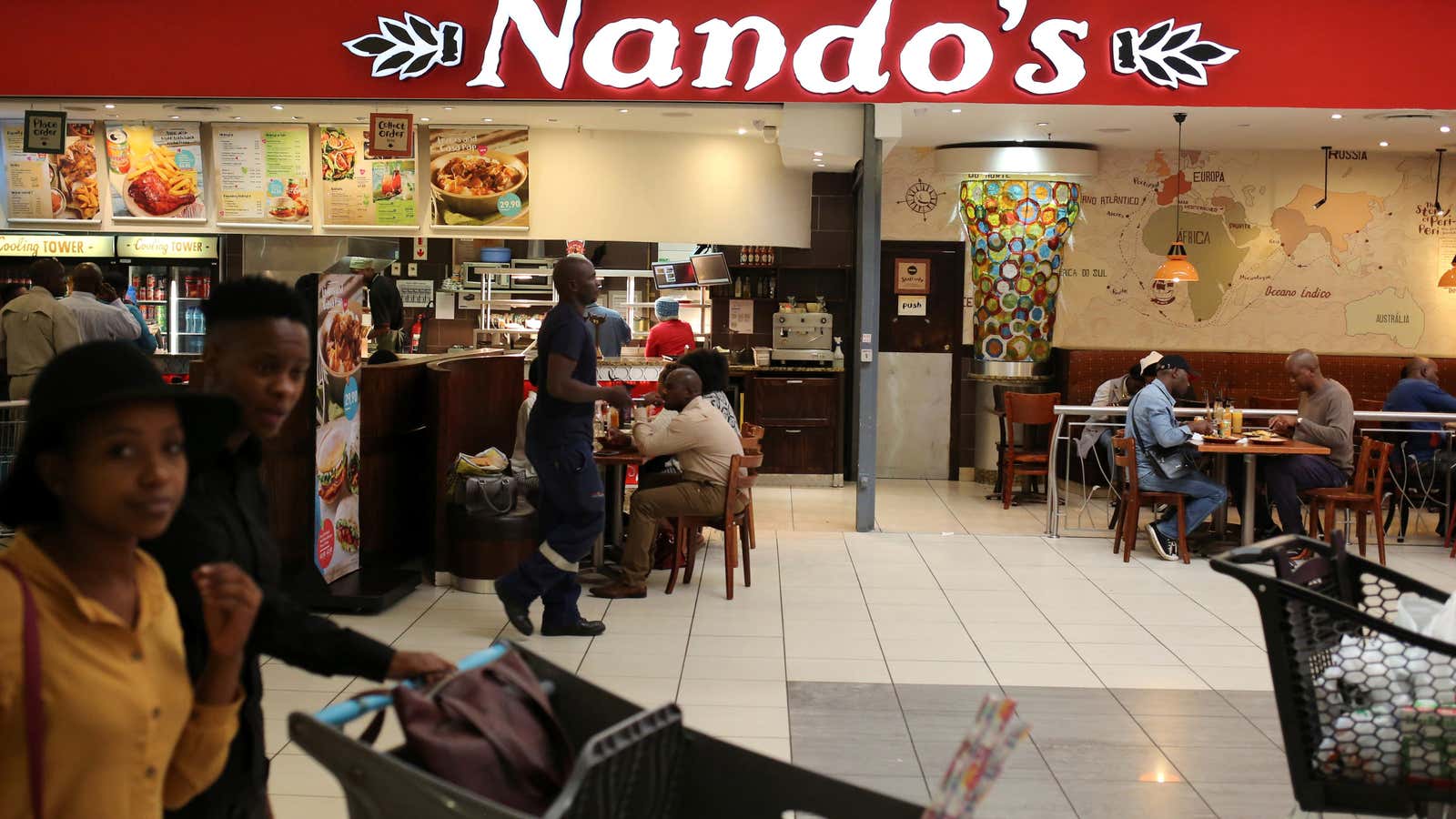It was a moment in a speech long ago. Jacob Zuma, South Africa’s president at the time, was talking about the membership figures of the ruling African National Congress (ANC) at a party convention in 2015 when he encountered a number that twisted his tongue.
“Seven-hundred and sixty-nine, eight-hundred and…seven hundred—listen properly— seven-hundred and sixty-nine thousand, eight-hundred and twenty and seventy members, down from one hundred point two million in 2012,” Zuma said, struggling to read out 769,870 from a piece of paper in front of him at the lectern.
Cue laughter among those gathered in the hall, and online.
Now six years later, that tongue-twister is providing fodder for jokes at a time when Zuma has no cause for laughter. This week, the man who ruled South Africa from 2009 to 2018 was sentenced to 15 months in prison by the nation’s highest court for failing to cooperate with a corruption inquiry investigating allegations of graft during his tenure.
Nando’s, the South African chain of restaurants best known for its peri-peri chicken and spicy commercials, took a jab at Zuma’s misfortune in a tweet that is stirring up old feelings. “A lockdown we can all get behind,” the tweet read. In an attached photo, it continued: “Do not pass Go. Do not collect. Seven-hundred and sixty-nine eight-hundred million. Delivery in 5 days.”
To avoid all doubt about who the tweet was about, the restaurant added: #JacobZuma. The tweet packed a lot in a few words. The lockdown was in reference to newly-imposed restrictions imposed by current president Cyril Ramaphosa this week, to stem the spread of the highly contagious Delta variant that is currently ravaging the country amid a slow rollout of coronavirus vaccines. The five-day delivery timeline alludes to the number of days Zuma was given by the court to turn himself in before the police arrest him.
Pandemonium ensued on Twitter. Zuma, who still holds considerable political power, has a lot of fans. And many of them were not shy to tell the restaurant chain what they thought of their antics. One posted a video of themself throwing away a Nando’s bag, saying the company had lost “this one custome.r” “This is why I stopped going to Nando’s, Nando’s are politically affiliated. They mendle (sic) in political narratives,” wrote another. One promised to “deal” with Nando’s at an unnamed time. On and on they went with vague threats of retribution and boycotts. Some saw the funny side: “Let me go and order Nandos. I see Zuma fans are catching feelings,.”
This isn’t Nando’s first dalliance with controversy. It ran an advert titled “Last Dictator Standing” not long after Libya’s Muammar Gaddafi was killed in 2011. That was followed in 2017 by a campaign titled “We can fix our s#*t”, a commentary about the state of corruption in South Africa. Zuma was president when that advert ran.
Doug Place, the chain’s chief marketing officer in South Africa, explained in 2018 why the company often wades into the issue of the day in its advertising. “We take pride in joining conversations and sparking debate around all relevant topics that are in the public interest. Often this discourse involves leaders, individuals and organizations that threaten the hard-won freedoms we enjoy as a country today and are therefore not free from public scrutiny,” Place said.
Controversial ads by chicken companies are also not uncommon in South Africa. In 2018, the Advertising Regulatory Board of South Africa, an industry regulator, banned a commercial by fast-food company Chicken Licken depicting a Black man discovering a foreign land in the 17th century and naming it “Europe.” It was a riff on colonialism, but the regulator deemed that it “trivializes an issue that is…upsetting for many South African people.”
Controversial tweets from a chicken company notwithstanding, Zuma’s sentencing is a seismic moment in South Africa’s post-apartheid history. There is a feeling in the country that there are no repercussions for politicians who dip their hands into the till. Zuma’s sentencing is a warning that no one is above the law. The chickens have come home to roost for the former president.
Sign up to the Quartz Africa Weekly Brief here for news and analysis on African business, tech, and innovation in your inbox.
